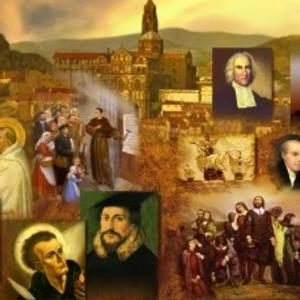A History of the Christian Church (Part 23) Maximus the Confessor (c. 580 – 662) The Man Who Wouldn't be Silenced
Send us a textMaximus the Confessor – The Father of Byzantine Theology[Part 23] Season 2, Episode 2 👋 WelcomeWelcome back to The History of the Christian Church! In Season Two, we continue our journey through the always vibrant and sometimes violent world of the Eastern Church. In today’s episode, we meet one of the most courageous and influential figures in Christian theology: Maximus the Confessor (c. 580–662). Philosopher, mystic, monk, and martyr in all but name, Maximus dared to defy emperors and resist compromise on one of the most essential truths of the Christian faith—that Jesus Christ is fully God and fully man.In a time when the unity of the empire seemed to hinge on theological concessions, Maximus chose faithfulness over safety. For this, he was imprisoned, exiled, and brutally mutilated. Yet his unwavering defense of the two wills of Christ would eventually be vindicated at the Sixth Ecumenical Council, shaping Eastern Christian theology for centuries to come.📜 Episode SummaryIn this episode, we explore:The dramatic and heroic life of Maximus the Confessor—from imperial court to desert monastery, from scholarly debates to imperial trials.The theological controversy of Monothelitism, and why it threatened the heart of the Gospel.Maximus’s unwavering belief in the full humanity and divinity of Christ, and why he insisted Christ must have two wills.How his theological reflections—on Christ, creation, love, and divine purpose—continue to shape Eastern Christian mysticism and theology.The tragic cost of his faithfulness: exile, torture, and silence. And yet, through it all, a lasting legacy that still speaks.🔑 Key ThemesChristology: Why the distinction between Jesus’ human and divine wills matters.Orthodoxy and Empire: What happens when political unity threatens doctrinal truth.Mysticism and Metaphysics: Maximus’s contribution to Christian mysticism and his engagement with Neoplatonic thought.Suffering and Witness: What it means to be a Confessor—to suffer for the truth without shedding blood.📖 Quote of the Episode.“We know God not in His essence, but by the magnificence of His creation and the action of His Providence, which present to us as in a mirror reflection of His goodness, His wisdom, and His infinite power.” — Maximus the Confessor, Centuries on Charity 1:96🙏 ReflectionMaximus’s story is not just about doctrinal precision. It’s about courageous fidelity to the Incarnate Christ. His life challenges us: Do we know what we believe—and are we willing to suffer for it? True theology leads not only to clarity, but to courage, worship, and love.🔔 Subscribe & ShareIf you’re enjoying this journey through church history, don’t forget to subscribe, leave a review, and share the podcast with friends or your church community. You can also support the show and get extra resources at https://patreon.com/JeremyMcCandless?utm_medium=unknown&utm_source=join_link&utm_campaign=creatorshare_creator&utm_content=copyLinkSupport the show

